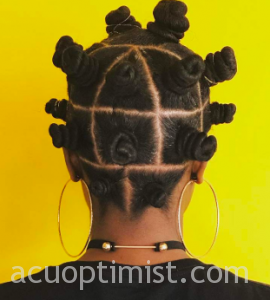The Office of Multicultural Affairs emailed students Wednesday in response to a hairstyle worn by pledges that resembled one common among African ethnic groups and popular with African-Americans.
The email, sent by OMA director April Napier, said fohawk buns worn by the pledges of Sigma Theta Chi during their pledging process resemble Bantu knots, which are popular among African-Americans, and the club requiring pledges to wear them “was viewed as insensitive to some students.”

Bantu knots have become more common among African-Americans in recent years.
According to the email, the hairstyle originated with the Bantu tribe in South Africa and was later used by slaves to distinguish families as well as locations. The hairstyle is worn by African-American women as a means to protect their hair. She also said while she realizes the club had no malicious intent, the incident offended some people and “highlights our need for greater cultural awareness and ongoing conversations.”
“This situation highlights how we can all continue to improve in the area of cultural competency, which is a priority in my role as the director of the Office of Multicultural Affairs,” Napier said. “We have resources, trainings, workshops and events offering the opportunity to learn about diverse cultures and identities. Along with this, OMA has leaders who are open to conversation, support and education for those who have questions or thoughts.”
Siggie President Allison Dennis did not respond to questions about the incident but did send a copy of an email the club’s officers sent to Napier. The letter said the club was deeply remorseful about the hairstyle and did not intend any disrespect and is taking the issue seriously.
“We are deeply grateful for those who are a part of our student body who called us out on this issue so that we could correct it and note to never let it happen again,” the letter from the Siggie officers said.
The pledges were told to create six-to-nine buns in their hair because the club was founded in 1969 and the fohawk hairstyle was meant to mimic pop-star Avril Lavigne’s fohawk buns.
Napier, who took on her role two months ago, would not respond to questions about the incident and said the office would not address media until after a Sundaes on Mondays event at 6 p.m. Monday in the basement of the Campus Center.
Kyndal Merritt, who is African-American, said while the hairstyle did offend her, she was more disappointed by the response of students when they learned female African-American students were offended.
“I know that this was not intentionally malicious and that some people were apologetic about it,” said Merritt, junior nursing major from Cedar Park. “But the majority of people dismissed this or found a way to make fun of it, which is disappointing given the fact that we go to a Christian school. How are you as a Christian going to tell someone they don’t have the right to feel hurt about something?”
Merritt said white students need to realize they will not always be able to understand why certain behaviors will offend minorities, and their lack of understanding should not cause them to become defensive.
“People were acting like we, as in people who took offense, called all of them racist and bad people, which is not what I think,” Merritt said. “They just need to understand that their actions are hurtful.”
Jerry Mares, senior business management major from Abilene, said the hairstyle worn by the pledges should not have grown into such a large issue.
“It’s ridiculous that Siggies have engaged in this behavior for years, and it only became a problem when a non-Bantu-affiliated individual made it an issue,” Mares said. “I get that there’re instances in which cultural appropriation can be an issue, but this is a far cry.”
Mares also said people could have seen the hairstyle in a more positive way rather than as an attack on their culture.
“If the Siggies think the Bantu style is so fly that they force their pledges to sport it, I would see it more as a celebration of an amazing culture,” Mares said.
The initial debate began on Twitter with the following tweet:
https://twitter.com/chelsea_derbs/status/1052356270232100864
Responses to the initial tweet were mixed between positive and negative.
https://twitter.com/JerryMares43/status/1052792772510568448
https://twitter.com/destinylyon_/status/1052383940357607424
https://twitter.com/Jconnor458/status/1052383376085327872
https://twitter.com/mariatotter/status/1052628041489440768

